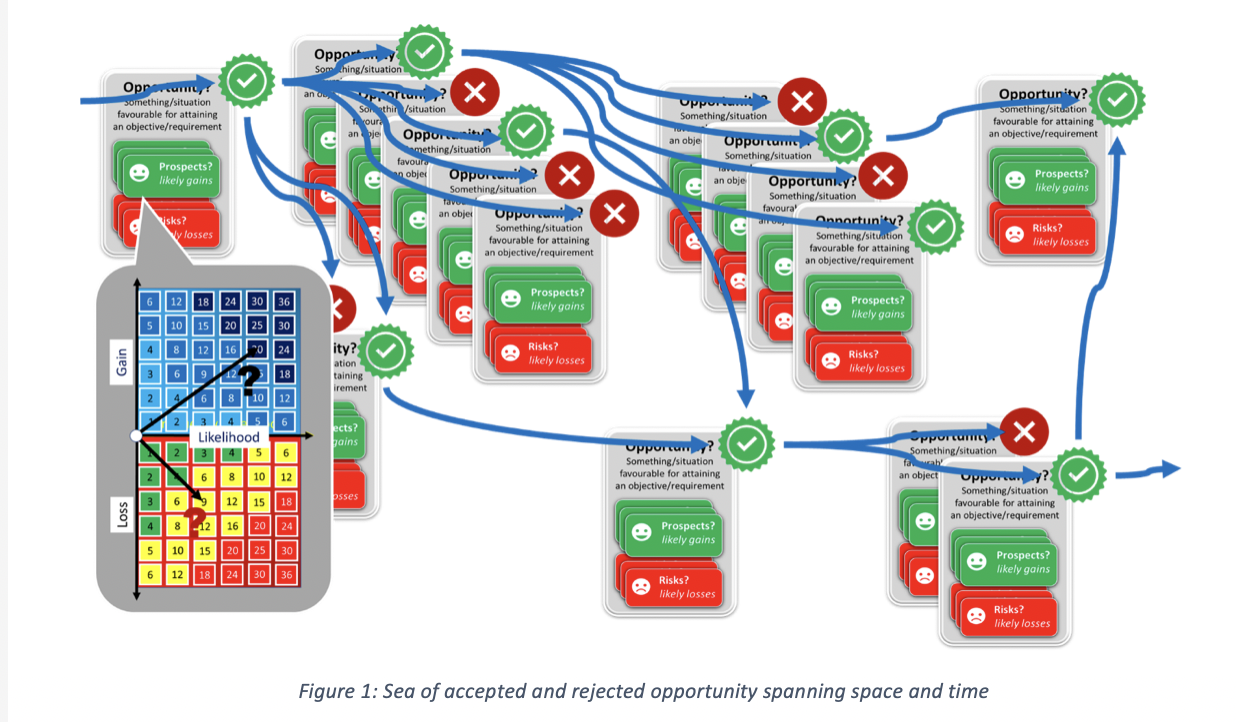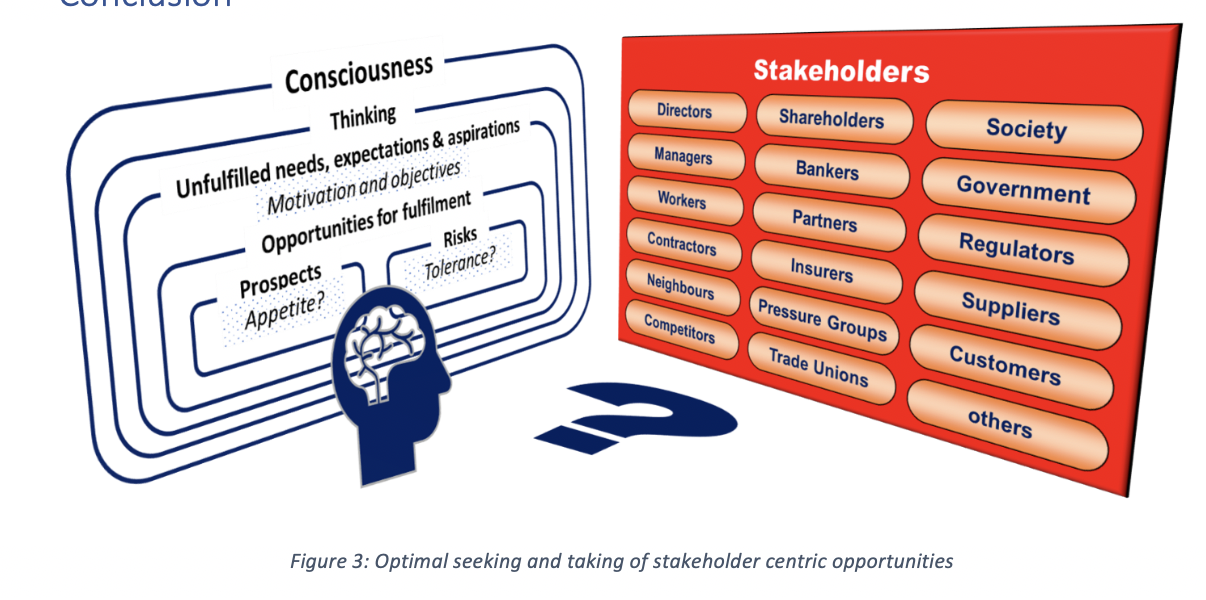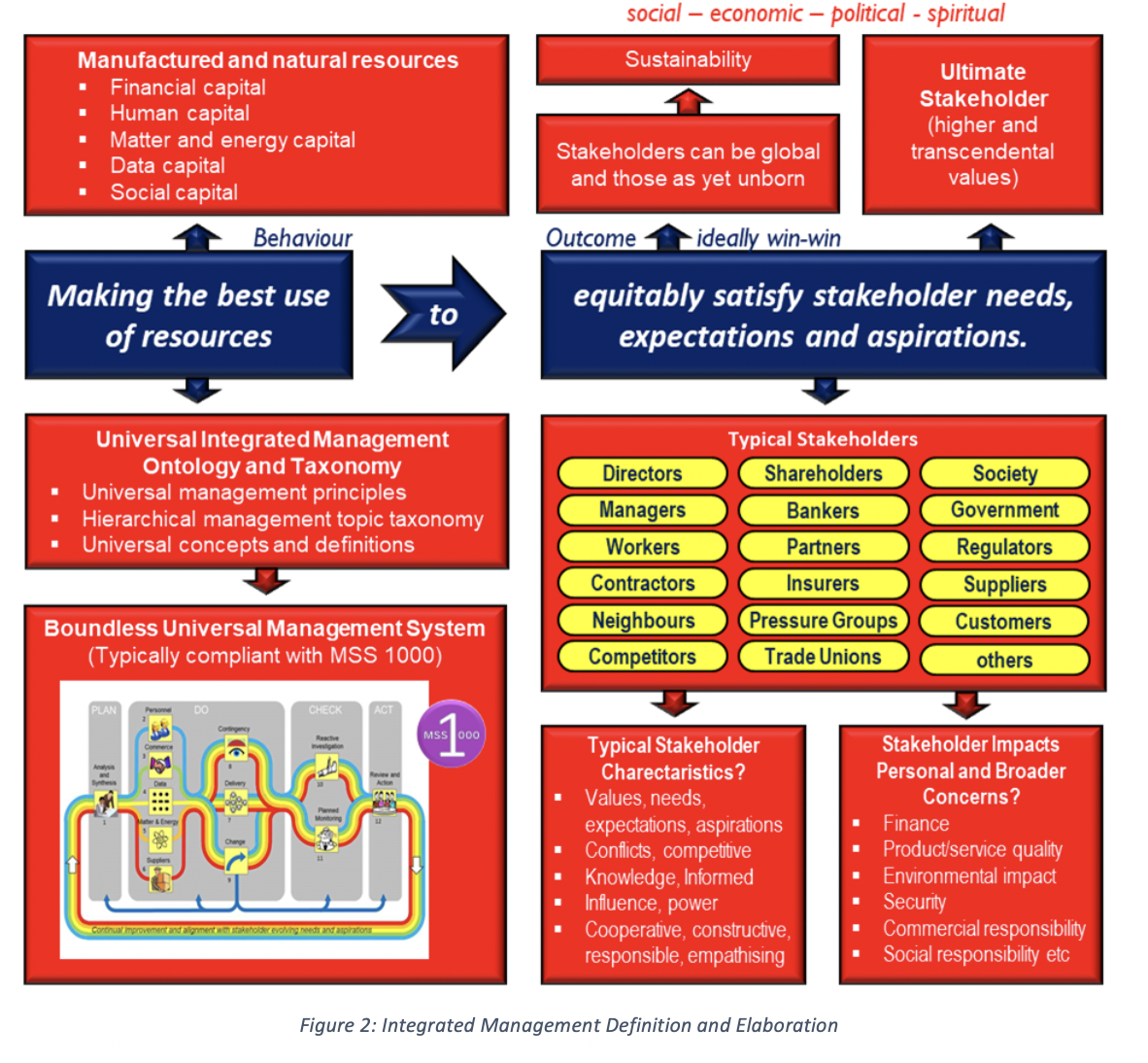 Building on the foundation concept that behaviour is just the taking and rejecting of ‘Opportunity’, Ian Dalling explains that:
Building on the foundation concept that behaviour is just the taking and rejecting of ‘Opportunity’, Ian Dalling explains that:
- The problems facing humankind have emerged from our fractured playing of the ‘Game of Opportunities’.
- Opportunity centric integrated thinking is the antidote empowering us to continually improve everyone’s quality of life. (see Game of Opportunities)
As conscious beings with free will, we are natural opportunists relentlessly playing the ‘Game of Opportunities’ and attempting to balance its prospect and risk components. Our competence to play hinges on our knowledge, experience, beliefs, culture, relevant understanding of cause and effect, but principally on the quality of our thinking and how we interact with others which ultimately hangs on our level of consciousness.
The agricultural and industrial revolutions empowered humankind to take unfettered commercially attractive opportunities but with significant impacts on our quality of life and the natural world’s life-sustaining resources and ecosystems. Through arrogance, ignorance and self-serving we have now inherited a legacy of global challenges needing urgent attention.
Circumstances now demand that we up our game to solve global problems, prevent the poisoning of everything that we value, and empower everyone to share in an expanding quality of life and fulfilment. Future generations will inherit the outcomes of how we manage today and will not excuse our failure.
Leading politicians, company CEOs and forward-thinking activists often speak of the imperative of joined up thinking in management in their keynote speeches and writings but generally fail to elaborate on its practical delivery. However, a growing body of management knowledge based on integrated thinking and is being applied by enlightened organisations indicating that we can avoid mirroring our past behaviours.
Flawed historical play
Historically, success tended to be uncertain, partial, sometimes disastrous together with unintended consequences. Management approaches to create and retain value were generally fragmented, non-holistic, narrowly focused on short-term gain, disrespected stakeholder needs and the greater good. Joined-up integrated thinking was uncommon and there was an arrogant disregarding of our vital dependency on the natural world and its life supporting resources and ecology.
Even organisations aware of the multiple impacts of their organisations struggled to see and manage them as components of one interconnected and interdependent big picture and manage them holistically at strategic and operational levels. This resulted in weak fragmented systems of governance, management, knowledge structures, communication, education, and training. Typical underachieving behaviours included:
- Multiple fragmented silo focused management system standards with non-unified ontologies and taxonomies.
- Lack of single boundless Integrated Management Systems addressing the totality of organisations and their stakeholders needs.
- Silo focused professional and academic institutions promoting narrow fragmented management of one aspect of performance in isolation everything else.
- Non-holistic management theories, models and approaches lacking recognition of consciousness, an equitable stakeholder centric focus and optimal use of resources.
- Goods and services ignoring stakeholder impacts and best use of resources.
The ‘precautionary principle’, which requires that we avoid all unnatural experimentation with unbounded risk, has been disrespected leading us to arrogantly play god, manipulate nature and gamble with unknowable outcomes through insufficient knowledge and concern for the potential consequences. Examples include:
- The irreversible genetic modification of organisms (GMO) potentially degrading our mental and physical wellbeing, and even our consciousness affecting our competence to think coherently and play the ‘Game of Opportunities’ optimally.
- Creation of materials that are life harming and otherwise polluting and non-biodegradable.
- Regulating reactively after significant problems have emerged such as the electronic management of personal data.
Antidote is transformational integrated thinking
Transformed behaviour depends on our ability to discriminate between right and wrong opportunities which critically depends on integrated, coherent, and holistic thinking. Whenever confronted by opportunities a different attitude and perspective must prevail that endeavours to equitably meet stakeholder needs while making the best use of resources. Opportunities must be understood as interconnected and interdependent and needing to be managed considering the full breadth upsides and downsides impacting stakeholders unrestricted by space, time, or stakeholder need, see Figure 1.
 Governance and management systems must become fully integrated and coherent to promote and support global enlightened life-supporting behaviour. Enlightened opportunists understand that opportunities, however attractive, are not composed of just upsides but also of downsides. They seek opportunities where the stakeholder prospects (likely enhanced value) significantly outweigh the risks (likely value loss) and is appropriately equitably stakeholder balanced. Addressing the big picture may present a choice between several alternative opportunities each with their associated prospects and risks.
Governance and management systems must become fully integrated and coherent to promote and support global enlightened life-supporting behaviour. Enlightened opportunists understand that opportunities, however attractive, are not composed of just upsides but also of downsides. They seek opportunities where the stakeholder prospects (likely enhanced value) significantly outweigh the risks (likely value loss) and is appropriately equitably stakeholder balanced. Addressing the big picture may present a choice between several alternative opportunities each with their associated prospects and risks.
Integrated management
Optimal management depends on fully coherent integrated thinking supported by corresponding management structures and processes. Integrated Management was formally defined by the Integrated Management Community (IMC) in 2002 (originally a CQI SIG) and is shown in Figure 2. Sustainability automatically emerges from this simple definition, as does the concept of boundless Integrated Management Systems addressing the totality of an organisation without boundaries.
The first Universal Management System Standard MSS 1000 addressing the totality of the management of an organisation without boundaries was developed by an IMC international expert team and published in 2014. Its scope went beyond existing ISO auditable management standards, embraces integrated prospect and risk assessment and is free to download globally.
MSS 1000 defines a set of universal management concepts, definitions, and principles and facilitates the creation of fully Integrated Management Systems using twelve management control procedures.
A fully integrated boundless management system facilitates successful playing of the ‘Game of Opportunities’ and empowers cooperation, coordination, and exploitation of diverse competence. This enables the emergence of synergistic, creative, and innovative benefits. Optimal management systems need to be comprehensive without boundaries, fully integrated, simple, and transparent so that every element of the organisation is coherently managed with respect to the whole to produce equitable stakeholder outcomes. The first step in their creation is to avoid forming separate multiple fragmented diverse management systems and standards which has typically been promoted by ISO silo-based thinking.
A boundless fully Integrated Management System empowers the organisation to direct, guide and control every aspect of the organisation coherently fulfilling its purpose and duty. The management system should create a climate that encourages and supports innovation, continual improvement and ongoing alignment with the evolving needs, expectations, and aspirations of the stakeholders. This ensures that every actor within the organisation should be in no doubt as to how the ‘Game of Opportunities’ should be played and won in the interests of all stakeholders.
 Conclusion
Conclusion
On the level of consciousness, we inescapably manage within a bounded bubble of opportunity that has been to a large degree created by past play. Equitable balancing of the subordinate prospects and risks components fulfils stakeholder needs, expectations, and aspirations.
Significantly upping of our individual and collective ‘Game of Opportunities’, ultimately depends on nurturing our individual and collective consciousness. Everyone’s imperative should be to prevent the future from mirroring the past, solve our global problems, prevent the poisoning of everything that we value, and enable everyone to share in an expanding quality of life and fulfilment.
Yesterdays fractured narrowly focused thinking must be supplanted by coherent, holistic joined up thinking and management. Every endeavour of whatever type and size, must be planned, delivered, and managed based on integrated thinking and a holistic opportunity centric perspective. The knowledge already exists and is being implemented by enlightened organisations. Duty demands that we grasp this antidote and secure future generations who will surely not forgive us should we fail to transform from silo-based thinking to fully integrated thinking.
Bio Ian Dalling
Ian Dalling is the Director of ‘Unified Management Solutions’, that specialises in integrated approaches to quality and risk management. He is a Chartered Mechanical and Electrical Engineer, a fellow of the Chartered Quality Institute, a fellow of the International Institute of Safety and Risk Management and holds degrees in engineering and physics. He is a retired management consultant and chair of the Integrated Management Community.
Ian’s career commenced in 1962 working for the Central_Electricity_Generating_Board in various posts within nuclear power plants embracing operations, planning, management services, quality management. In 1989 he moved to the United_Kingdom_Atomic_Energy_Authority Safety and Reliability Directorate (SRD) as a risk management analyst and consultant.
His career has spanned the design, construction, commissioning, operation, and decommissioning of conventional and nuclear power plants, as well as providing a wide range of quality/risk management consultancy in other major hazard industries including oil and gas, electrical power distribution, rail, construction and medical devices. He started his own management consultancy in 1999 delivering services for clients in the UK and internationally in Eastern Europe, India, and China for national and international clients. He chaired the Chartered Quality Institute Integrated Management Special Interest Group from 2007 until 2020 when it was morphed into the Integrated Management Community. Ian led the international team that created the world’s first universal management system standard without boundaries (MSS1000). He has published many integrated management papers and articles.
His roles have included:
- Leading operational planning team during the construction and commissioning of the Dungeness B Advanced Gas Cooled Reactor nuclear power plant.
- European Notified Body Quality Manager certifying machinery and medical devices under European Product Directives.
- Serving on the European Process Safety Centre Committee, and the British Standards steering committee for BS 8800:1996, a guide on the management of occupational health and safety. BS8800 informed OHSAS18001 which informed ISO45001.
- Leading a team assessing the 120-year decommissioning programme for the Winfrith Steam Generating Heavy Water Reactor in the UK.
- Assessing UK nuclear weapons assembly and maintenance safety culture.
- Developing crisis and emergency plans for a regional electricity company.
- Member of international team that assessed the safety of the Lithuanian Ignalina RBMK nuclear power plant following the Chernobyl_disaster.
- Providing systems analyst support during the development of safety critical software.
Publications
Ian Dalling has published many articles on integrated management and the universal management system standard MSS1000 in a range of publications including CERM Risk Insights, the International Institute of Risk Management (IIRSM), the Chartered Quality Institute (CQI), and the International Register of Certified Auditors (IRCA) Journals.
Publishing a book on integrated management is still on Ian ‘s to-do list. The closest to fulfilling this aspiration has been the drafting of the 300 page universal management system standard MSS1000 which he intensely focused on between 2011 and 2014. It was based on a set of mutually consistent unified management principles, concepts and definitions. MSS1000 had been demonstrated to be possible in his article ‘Order from Chaos’ published in the April 2011 edition of Quality World which explained a full scope boundless hierarchical management topic taxonomy. In essence, the taxonomy defined a logical place for everything that can potentially be needed in a management system, standard, regulation, license etc. and was informed by his quality and risk management consultancy experience and the creation of proven full scope boundless integrated management systems created with his clients.
Ian has published the following notable papers on various aspects of integrated management:
- Research into relationships and correlations between plant safety performance and occupational safety performance for British_Energy and BNFL Magnox in conjunction with DNV, 2000.
- Understanding and assessing safety culture, Society for Radiological Protection meeting, Saint Catherine’s College Oxford, 9 April 1997, published in the December 1997 Journal of Radiological Protection. Includes the ‘Dalling Model’ of organisational performance.
- The Future is Unified – a Model for Integrated Management, Quality World, April 2000.
- Integrated Management Definition, CQI Integrated Management SIG, 2002, reissued 2007.
- Eyes and Ears (integrated monitoring), Quality World, April 2004 – subsequently translated and published into Chinese and Japanese in the ‘Global Sources’ journal.
- Integrated Management System Definition and Structuring Guidance, CQI Integrated Management SIG, 2007.
- Order from Chaos (management topic taxonomy), Quality World, April 2011.
- Drafting of Universal Management System Standard MSS1000. 2011-2014.
- Management Integration: Benefits, Challenges and Solutions, International Institute of Risk and Safety Management (IIRSM) Technical Paper, March 2012.
- Managing Data in an Evolving World – A guide for good data governance, International Institute of Risk and Safety Management (IIRSM) Technical Paper, August 2016.
- Using MSS 1000 to Boost Performance, CQI Integrated Management, October 2016.
